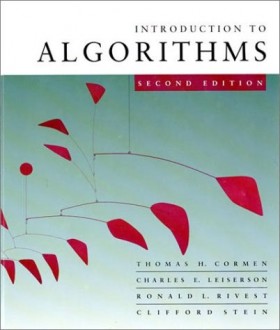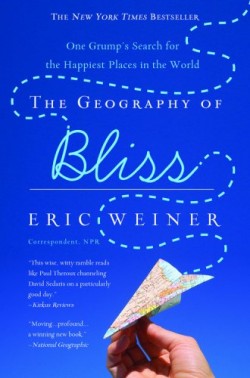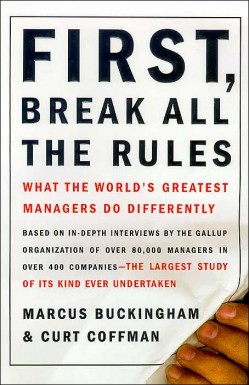This is the website of Abulsme Noibatno Itramne (also known as Sam Minter).
Posts here are rare these days. For current stuff, follow me on Mastodon
|
 Author: Thomas H. Cormen and others Author: Thomas H. Cormen and others
Started: 10 Apr 2010
Finished: 3 Oct 2010
Format: Hardcover
1180 p / 177 d
6.7 p/d
So, this was another book from my “to read for work” pile. The idea behind this one was to increase my technical depth in certain areas that might be helpful for me. The material in here was of course not all completely new. I’d covered some of it in 15-211 back at Carnegie Mellon, and even some at a Computer Science course at John’s Hopkin’s Center for Talented Youth when I was in high school. The difference of course was that in both of those, at least as far as I can remember them… it has been a long long time… the overview happened at a bit higher level, not diving as deep or getting as intensely into the proofs and such that this textbook does.
Which brings up an important thing. This is indeed a textbook. It isn’t really intended to be “read” in the way I read it, sequentially from beginning to end, one page at a time. Ideally it is used in conjunction with an actual instructor led course and lectures. You might jump around in the book, spending lots of time on some areas, not much in others, and skipping others entirely. Reading straight through is a bit of a slog. 1180 pages of for the most part really dry and boring stuff. Now, to be clear, some of the material itself is kind of fun and interesting. I like thinking about algorithms and the ways in which those kind of things can work. But a textbook like this in isolation, without a course, without any multimedia, etc, and one that concentrates on the proving of theorems about the algorithms and such, just isn’t the most fun way to investigate these things. At least for me. (And this translates directly into my pretty sad 6.7 pages per day average rate for this book.)
Time after time when reading about some new algorithm, I would bemoan the figures and diagrams in the book and think that my intuition of what was supposed to happen could be instantly jumpstarted if instead of the static diagrams and text there were engaging animations, perhaps with interactivity to change initial parameters and see how things were affected, etc. Instead, on any of the more complex ones, I would need to decide to either spend a decent amount of time slogging through log by line, or just decide it wasn’t worth it and move on. Now, I guess I know that the POINT is to slog through it line by line and figure it out. But still, getting the general concept across could happen so much more efficiently in other ways. But again, the goal here often is not getting the general concept across, but is rather in all the little details.
Of course, some chapters were more fun than others. From my particular perspective, not that excited by sorts or data structures, or analysis techniques. Graph algorithms on the other hand are fun. I especially enjoyed the chapter on Maximum Flow. (Not that I have retained much, other than I found it interesting.) The number theory stuff is fun too. I thought I’d enjoy the NP-Completeness discussion as well, but in the end I really didn’t.
Overall, it was a text book. So although there were bits that were interesting or piqued my interest, for the most part it was a chore to get through rather than something enjoyable. I really should get it through my head at some point that books like this are useful as reference, and most certainly as something augmenting an actual course… but reading books like this from beginning to end, one page at a time, definitely just kill my enjoyment of reading as an activity. Which isn’t to say there might not be others like this in my future. There will be. There are some on my list. But hopefully it will be a little while.
 Author: Orson Scott Card Author: Orson Scott Card
Started: 26 Mar 2010
Finished: 10 Apr 2010
592 p / 16 d
37.0 p/d
I continue to make my way through all of the Ender Series on my way to the latest in the series which Brandy gave me awhile back. This time it is Xenocide, the third book in the series.
The third book is a bit more blah than the first two books. It is still an interesting book and examines some fun concepts, but it seems that the first two books had more big, new and surprising things. This one just sort of continues the story. You explore the notion of different levels of alienness some more. It makes you think about what makes a person a person, and about how much you have to change a person before they aren’t really the same thing any more. Fun stuff to philosophize about. But it did seem like somewhat treading the same waters that were covered in the last book.
To be clear though, it is still a fun story, and leaves me wanting to read Book 4. I think when I read this series before many years ago, I only got to Book 4. So I’m eager to go ahead and read Book 4 (the plot of which I can’t say I really remember) and then get on to Book 5 and beyond.
I will also say that in this series the character I’ve always enjoyed the most is “Jane” the sentient computer network. I remember when I was a teenager reading a lot of books that had sentient computers as characters, and it was always something I was drawn to. Of course we still don’t have good sentient computers. They really need to get back to working on that.
 Author: Eric Weiner Author: Eric Weiner
Started: 24 Nov 2009
Finished: 26 Mar 2010
345 p / 123 d
2.8 p/d
So, finally finished another book a few days back. As has tended to be my pattern the last few years, I have read much more slowly when I’m doing non-fiction books and this was no exception. As you can see above, I averaged a pitiful 2.8 pages per day. This of course was not a consistent rate, but rather it was many many days of zero pages, interspersed with days where I would read a bunch more. I basically didn’t read any at all in December, January or February, but then in March decided to actually start reading again and finish it off.
Anyway… this is a book I got as a gift awhile back. It is about this guy who decided to research “happiness” and how it varied geographically… Are some countries happier than others? Can a person learn from the way different countries approach the idea of happiness and how they go about their lives in order to make oneself happier, etc.
As part of his research he visited a variety of countries…10 countries including the US actually. Some were countries that on surveys had reported being happier than average… others the opposite, reporting that folks were generally much less happy than other places. He investigated how people approached life, what they thought made them happy, or not, etc.
Overall, I think it was a pretty interesting travelogue of interesting places to live or visit, with a lot of nice stuff comparing and contrasting various aspects of these cultures. I’m not sure in the end if it really offers an answer to the questions he set out to answer about happiness… one conclusion did seem to be that if what makes you personally happy matches better the overall tone of life in some other place better than it matches it where you are at the moment, then perhaps you would be a better match for that other place. Maybe.
I’ve always been more a “home is where you happen to be” type of person, but I can definitely see this. There are certainly places I have visited where I can confidently say a visit is the most I would like to do. In some cases a few hours is enough, in others maybe a few days or weeks, but I could tell I would be miserable LIVING in those places… There are other places I have visited that I immediately reacted with “I could live here, I could really like living here.” (Hint as to type of places for me, very urban environments with high population densities wear thin on me very fast and I want to escape, I generally prefer suburban, and really like more rural when I can get it…)
Certainly different places I have lived have felt like more or less of a match, although I think for the most part how “happy” I was was only influenced by location to a small degree, with what was going on in my life, what I was spending most of my time doing, and who I was doing it with having a much much larger influence. But did the place and the collective effect of the types of attitudes and habits and lifestyles of those around me have a background effect that was perhaps significant in some cases? Sure, I’m sure it did.
All in all this was an interesting thought provoking little volume. No answers really. But some nice profiles of some interesting places, some of which sounded like places it would be fun to at least visit… and maybe a couple of them would be places I could see living… worth the read. Although I do wish I’d had the consistency to go through it at maybe 10 or 20 pages a day at least instead of the truly pitiful 2.8 pages a day. I really need to do better than that. It is easy for me to do better than that on the fiction books, but bogging down on the non-fiction is something I need to get better at avoiding.
 Author: Orson Scott Card Author: Orson Scott Card
Started: 1 Nov 2009
Finished: 24 Nov 2009
280 p / 24 d
11.7 p/d
So, as I mentioned when I read Ender’s Game back in May, Brandy gave me the latest Ender book last Christmas, and I decided I needed to read the whole series again, both those I’d read before and those I hadn’t, before I read the new one. So now it was time for book two.
This picks up Ender’s story several thousand years after the events in the first book (relativistic travel allows one do do that sort of thing while still living a normal lifespan). He now is a “Speaker for the Dead” and is unraveling several mysteries, one involving the life cycle of a newly discovered alien species.
The bits about how that life cycle works, and the confusion it causes in the relationship between humans and the piggies (said other species) because of lack of understanding are very creative and interesting. This is once again a book that suffers on second reading though. Even though it has been many years since I last read this book, I remembered the critical bits that meant I knew the answers to many of the mysteries from the beginning. The figuring out what was going on was, I remember, a big part of the experience of reading the book the first time around, and that was absent the second time for me.
One other big part though, that didn’t lose quite as much impact the second time around, was the concept of the “Speaker for the Dead” itself. Basically, the idea is that this is someone who does funeral orations. But not the kind where all the good aspects of the person are praised. But rather the speaker spends a good deal of time learning about the person, digging into their secrets and their dark sides as well, and then essentially “speaks the truth” telling the story of the person’s life, from childhood to their death, but not shying away from the negative or disturbing… or from the positive either… but trying as much as possible to give an honest accounting. The good, the bad, the mediocre, the things they were proud of, the things they were ashamed of, etc… The idea being that this kind of truth telling is a more powerful thing than sugar coating, and more powerful in letting the survivors understand and move on. Even if it opens wounds, it provides opportunities for healing.
Anyway, I liked that concept when I read it the first time, and I still like it. I wouldn’t mind there being a “speaking” for me when the time comes. Of course I wouldn’t mind, I won’t be there. But I like the concept. :-)
 Author: Marcus Buckingham and Curt Coffman Author: Marcus Buckingham and Curt Coffman
Started: 30 May 2009
Finished: 1 Nov 2009
271 p / 156 d
1.7 p/d
So, this was a book that my manager at work had picked to be the focus of a little reading group sort of thing where several of us would read this and every couple of weeks or whatever we would discuss a bit of it over lunch. Well, that never materialized, but I read it anyway. Slowly. Over a long period of months.
This is another one of those books where I never got the compelling feeling of needing to turn the page, where instead it felt like somewhat of a chore. So, since that reading group was not actually happening, the result was I would read a few pages, then put the book down for a month or whatnot before reading more. This is a short book. It is an “easy read”. The whole thing could be read in a couple of hours. In fact, I finished it when one day I just decided I wanted to be done so I could move on to the next book, so I finished it off that afternoon. But I never felt, on my own, that this was an exciting text where I was eager to get to the next page.
Now, that aside, the actual content itself… this is one of that whole cottage industry of books on how to be a good manager. The key elements of this one are basically around recognizing the differences between the innate qualities people have vs things that are changeable and adaptable… and basically that you should work to figure out the best ways to take advantage of natural innate strength and not spend a lot of time or energy trying to “change people” to make them match expectations in a particular role. There was more nuance of course, and they backed things up through studies and illustrated them with anecdotes… and they made a few other points as well. But I think that was the main one.
I guess my primary take away from this was that some of the points probably should be obvious, but are clearly not. Other things seemed like good insights. But it could have all been fit as a few general statements on a poster or something, it didn’t seem like stuff that really needed a whole book, even a pretty light 271 page book to get across. OK, I guess laying it out methodically and having a lot of illustrative anecdotes can be helpful to get the point across and to put weight behind what would otherwise just be declarative aphorisms. OK, I get that. I just was feeling “OK, I get that point already, lets move on” pretty often.
It did have some good points though, and probably highlighted some things that even if I was aware of, I have not been fully utilizing at work, and perhaps I should… so that is good I guess. :-)

|
|
 Author: Thomas H. Cormen and others
Author: Thomas H. Cormen and others


